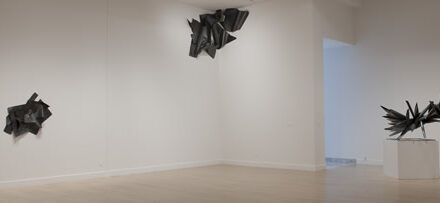There are no ifs, ands, or buts about it in Catawba County, for sure – the Hickory Choral Society is the best classical vocal ensemble in the area, by far. Elsewhere in North Carolina, it’s not so well known. More’s the pity, for it is clearly one of the best choirs in our fair state – a group that in technical and artistic terms can more than hold its own against organizations with far greater name recognition. Part of the reason for this is that good singers seeking a superior choir in the Unifour area have fewer choices than, say, vocalists in the Triad or Triangle. (This means, too, that the very best singers wind up all together and not divided among several groups.) Another part of the reason is the superior, long-term leadership of founding conductor J. Donald Coleman, whose musical curiosity and boundless energy are regularly brought to bear on programs of richly varied merit, delivered with keen insight. (Can he ever train singers!) And to cap it all off, the HCS-Coleman partnership has lasted long enough to earn the complete confidence and trust of enthusiastic choral music audiences from throughout the region, so the concerts the HCS offers are almost always completely packed. The latest one, given on a beautiful Sunday afternoon in the commodious, acoustically-splendid First Baptist Church, was (apparently) a rare exception to the norm in that there may have been as many as 50 empty seats in the balcony!
For this, the first program of its 35th season, the HCS took its audience on a whirlwind world tour, offering mostly short selections from all over. The opener was an a cappella version of “My Lord, What a Mornin’,” arranged by Burleigh, with truly exquisite balance, blend, phrasing, diction, and extraordinarily refined dynamics. Truly, if they’d stopped after this opener, it would have been enough to justify the trip.
There followed Five Hebrew Love Songs by Eric Whitacre, with accompaniment from the Kontras Quartet, the estimable chamber group currently affiliated with the Western Piedmont Symphony. The songs are diverse, as admirers of the composer’s work might have expected, and the performances were outstanding, whether involving the women alone, the men, the entire cadre of singers, or soloist Tracy Hamlin.
Percussion from Mike Filip accompanied the singers in a Swahili prayer set by Jonathan Willcocks; this had a wonderful lilt and its sentiments were clearly projected from the hearts of the musicians.
Kevin Barlowe was the soloist in an admirable version of “Loch Lomond,” arranged by Jonathan Quick. Once again the diction was immaculate, and the artistry with which this familiar tune was invested took away one’s breath.
The first half ended with one of the afternoon’s more substantial numbers, “Dark Night of the Soul,” a fairly recent composition by Ola Gjelio of Norway for mixed voices with string quartet and piano (Mary Texer) in which the singers took on ever-higher levels of emotional depths, resulting in exalted sublimity.
The second part of the concert began with another new work, this time for chorus and koto, by Stephen Rotz and the afternoon’s instrumental soloist, Tad Sahara. “Aika,” sung in Japanese, English, and Latin, speaks of the calm preceding the tsunami, the storm itself, and universal prayers for eternal rest. The narrators – who spoke of radiation levels at the damaged nuclear plants – were Harry Andrews and Julie Braswell. At the end there was a brief pause of stunned silence before the applause.
Three somewhat more traditional selections brought the program to its end but in no case was the music without unusual interest. There was a lovely new Magnificat by South African composer Péter Louis van Dijk, with string quartet accompaniment. There was Beethoven’s sublime but rarely-heard “Elegischer Gesang,” Op. 118, also with quartet, with its atmospheric prefigurings of the Missa Solemnis and the Ninth Symphony. And there was a grand finale arranged by David Willcocks using a text called simply “Sing” – what could be better for a choral group? – that featured organist David Lail and music lifted and adapted from Widor’s celebrated Toccata, from the Fifth Organ Symphony.
There could not have been an encore after that – and there wasn’t!
The fine program book included texts and translations and reflected as well the enviable support the 110-voice HCS enjoys in its community.
It’s been a long time since this choir performed in the Triangle – too long. Enterprising orchestral conductors throughout the state, looking for some variety in the choirs with which they work, would do well to consider these Catawbans.
The season continues with Christmas concerts on December 7, 8, and 9. For details, check our calendar closer to those dates.











